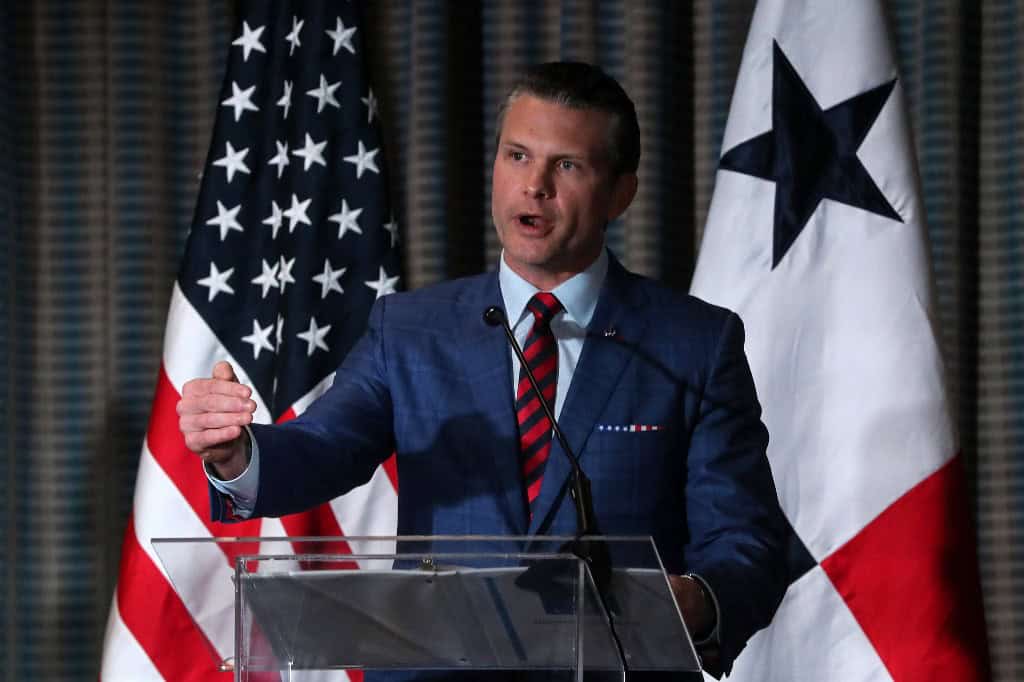US Defense Secretary Pete Hegseth floated the idea on Wednesday of US troops returning to Panama to “secure” its strategically vital canal, a suggestion quickly shot down by the Central American country’s government. Hegseth suggested during a visit to Panama that “by invitation” the United States could “revive” military bases or naval air stations and rotate deployments of US troops to an isthmus the United States invaded 35 years ago.
He also said his country was seeking free passage through the canal for its Navy ships — which US President Donald Trump had said were “severely overcharged and not treated fairly in any way, shape or form.” Trump, since coming to power in January, has repeatedly claimed that China has too much influence over the canal, which handles about 40 percent of US container traffic and five percent of world trade.
His administration has vowed to “take back” control of the strategic waterway that the United States funded, built and controlled until 1999. Hegseth suggested on Wednesday the slew of former US military bases that dot Panama could be used again to host US troops.
He said a deal signed with Panama this week was an “opportunity to revive, whether it’s the military base, naval air station, locations where US troops can work with Panamanian troops to enhance capabilities and cooperate in a rotational way.” Hegseth cited the possibility of “joint exercises” but the mention of a “rotational” force is likely to raise the hackles of Panamanians, for whom sole ownership of the canal is a source of intense national pride.
The United States has long participated in military exercises in Panama. However, a longer-term rotational force — such as the one the United States maintains in Darwin, Australia — is politically toxic for Panama’s center-right leader Jose Raul Mulino. His government quickly slapped down the idea.
“Panama made clear, through President Mulino that we cannot accept military bases or defense sites,” said Panama security minister Frank Abrego in a joint public appearance with Hegseth.
Perceived threat
Hegseth also said the United States was seeking an agreement under which its warships could pass through the canal “first, and free.” Jose Ramon Icaza, Panama’s Minister for Canal Affairs, said “we will seek a mechanism by which warships and auxiliary ships can have a compensation system for services, that is, a way to make them cost-neutral” but not “free.”
The independent Panama Canal Authority (PCA) that manages the waterway said in a statement on Wednesday that it was seeking a “cost-neutral scheme” to “compensate services rendered in security matters for warship tolls.” Under current treaties, the canal is open to all nations and all vessels must pay the same rates according to their capacity and cargo, regardless of their country of origin or destination.
The PCA said the United States recognized Panamanian sovereignty over the waterway, although Hegseth did not mention it in the news conference. The Pentagon chief’s two-day visit has been peppered with comments about China and its influence in Latin America.
He said the United States was not looking for war with China but would counter Beijing’s “threats” to the region. “We do not seek war with China. And war with China is certainly not inevitable. We do not seek it in any form,” Hegseth said. “But together, we must prevent war by robustly and vigorously deterring China’s threats in this hemisphere,” the former Fox News anchor said in a speech.
Bullying nature
China hit back after Hegseth’s comments, saying US officials “maliciously attacked China… exposing the United States’ bullying nature.” Trump has zeroed in on the role of a Hong Kong company that has operated ports at either end of the canal linking the Atlantic and Pacific oceans for decades.
Hegseth asserted that China-based companies are also capturing Latin American land and infrastructure in strategic sectors such as energy and telecommunications, and that China has too large a military presence in the hemisphere. “Make no mistake, Beijing is investing and operating in this region for military advantage and unfair economic gain,” Hegseth said.
Under pressure from the White House, Panama has accused Hong Kong-backed Panama Ports Company of failing to meet its contractual obligations and pushed for the firm to pull out of the country. The firm rejected on Wednesday an audit that said it had failed to pay $1.2 billion due under its concession.
The ports’ parent company CK Hutchison announced last month a deal to offload 43 ports in 23 countries — including its two on the Panama Canal — to a consortium led by US asset manager BlackRock for $19 billion in cash. A furious Beijing has since announced an antitrust review of the deal.
The United States invaded Panama in 1989 to oust dictator Manuel Noriega, killing more than 500 Panamanians and razing parts of the capital.






